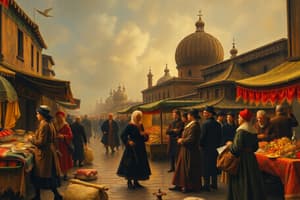Podcast
Questions and Answers
Anong kahulugan ng salitang 'bourgeois' sa kasaysayan?
Anong kahulugan ng salitang 'bourgeois' sa kasaysayan?
- Magsasaka
- Mamamayan (correct)
- Mangmang
- Dayuhan
Kailan nagsimula ang panahon ng Mercantilismo?
Kailan nagsimula ang panahon ng Mercantilismo?
- Ikalahating siglo
- Ikalabimpitong siglo (correct)
- Ikawalong siglo
- Ikadalawampung siglo
Ano ang isa sa mga teknolohiyang nabanggit na nauugnay sa pag-unlad ng kagamitang pang-industriya?
Ano ang isa sa mga teknolohiyang nabanggit na nauugnay sa pag-unlad ng kagamitang pang-industriya?
- Pandayang kalabaw
- Power Loom
- Pandayang lapad
- Spinning Jenny (correct)
Saan nagsimula ang Rebolusyong Industriyal?
Saan nagsimula ang Rebolusyong Industriyal?
Ano ang pangunahing layunin ng Mercantilismo?
Ano ang pangunahing layunin ng Mercantilismo?
Ano ang pangunahing epekto ng pagdami ng mga manggagawa sa mga siyudad?
Ano ang pangunahing epekto ng pagdami ng mga manggagawa sa mga siyudad?
Ano ang layunin ng mercantilismo?
Ano ang layunin ng mercantilismo?
Ano ang pangunahing layunin ng Renaissance?
Ano ang pangunahing layunin ng Renaissance?
Ano ang naging epekto ng National Monarchy sa pamahalaan?
Ano ang naging epekto ng National Monarchy sa pamahalaan?
Ano ang pangunahing kontribusyon ng bourgeoisie sa lipunan?
Ano ang pangunahing kontribusyon ng bourgeoisie sa lipunan?
Ano ang pangunahing layunin ng European empires sa panahon ng mercantilismo?
Ano ang pangunahing layunin ng European empires sa panahon ng mercantilismo?
Ano ang pangunahing karakteristika ng National Monarchy?
Ano ang pangunahing karakteristika ng National Monarchy?
Flashcards are hidden until you start studying
Study Notes
History Topics: Bourgeoisie, Mercantilism, Renaissance, National Monarchy
In historical discourse, several distinct periods hold significant importance due to their impact on society and economics. These periods can be broadly categorized into three main themes: the rise of the bourgeoisie, the influence of mercantilist practices, the cultural and artistic movement known as the Renaissance, and the emergence of the nation state under the banner of a national monarchy. Here's a brief overview of each theme:
The Rise of the Bourgeoisie
The term 'bourgeois' is derived from the Middle French word meaning citizen. In history, it refers specifically to wealthy merchants—those who earned money through trade rather than land ownership. This rising middle class was often associated with emerging industrialization, which led to new manufacturing processes such as the spinning jenny and power loom. The Industrial Revolution itself began in Britain in the second half of the eighteenth century and spread throughout Europe over the following decades. As urban centers grew, so too did the need for laborers. However, this also meant workers were paid less, leading to poverty and social unrest later in the period.
Mercantilism
Mercantilism started around the mid-seventeenth century and lasted until approximately 1815, when Britain emerged victorious against Napoleon Bonaparte at Waterloo. It involved the accumulation of gold by trading more abroad than one imported and the accumulation of silver by selling goods domestically. The idea behind mercantilism was to keep wealth within a country while also trying to increase its overall value. During this time, European empires engaged in wars to gain control of resources, including colonies where raw materials could be exported.
Renaissance
This cultural revolution started in Italy during the fourteenth century and spread throughout much of Western civilization before eventually reaching England in the seventeenth century. Key elements included humanistic learning, the concept that each person had inherent dignity, civic virtue, and moral responsibility. Artists like Michelangelo produced works that focused heavily on human emotion and individuality. Music was also popular, particularly pieces composed by composers like Thomas Tallis. Many historians consider these changes to have ushered in modern society.
National Monarchy
Monarchies traditionally held absolute rule, making decisions without consulting anyone else. But starting around the sixteenth century, kings and queens began working together with elected officials to create governments that represented people instead of just themselves. One example of this shift occurred in France between Louis XIV of France and Cardinal Richelieu. By combining royal authority with parliaments representing different regions, they created a system of government where everyone had some say in how things were run.
These four historical themes provide insight into how societies have changed over centuries. From the growth of cities filled with merchants to large colonial powers fighting for resources, from the exploration of emotions in art to democratic systems based upon representation, understanding these events helps us appreciate our current world more fully.
Studying That Suits You
Use AI to generate personalized quizzes and flashcards to suit your learning preferences.




